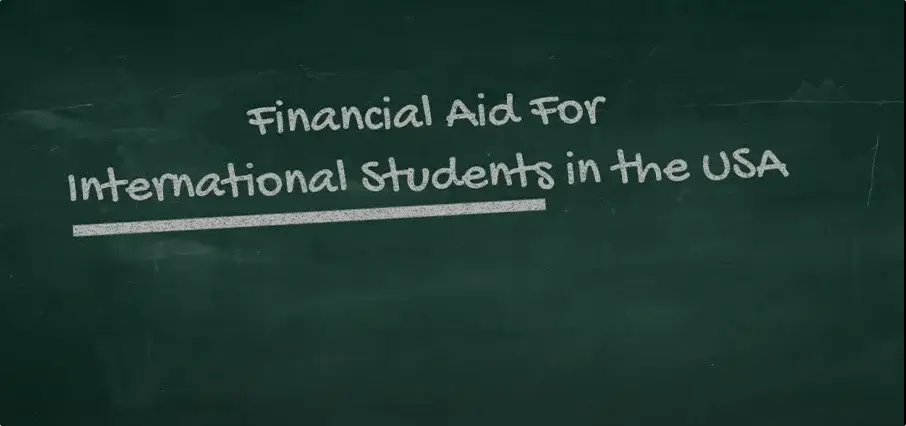
Financial Aid For
International Students In The USA
It can also be one of the most expensive, considering that international students will need to pay for their tuition and living expenses including room & board, utilities, transportation, books, and supplies, as well as health insurance – and students may not have all that money on-hand.
If you are like many international students interested in studying in the USA, or if you are already in the United States studying, you may be wondering how you can afford the high cost of all of these expenses as a foreign citizen. It's not going to be easy, but with some hard work and financial assistance, you can make your international education dream a reality.
So, what are your financial aid options to pursue your higher education in America if you don't have the financial resources to cover all your costs up front?
Financial Aid from the
US Government (and FAFSA)
The US Government provides financial assistance to US Citizens and Permanent Residents through the FAFSA* (Free Application for Federal Student Aid), but is limited in the financial support it gives international students.
Even though most foreign citizens are not eligible for federal student aid, the US Department of Education states that “Many non-U.S. citizens qualify for federal student aid. Don't assume you can't get aid just because you're not a citizen.” There are some instances in which non-citizens may be eligible for financial aid from the U.S. federal government. So all is not lost for you hopefuls. If you are on an international student visa, you may be eligible for these US government-funded programs designed for eligible noncitizens:
- Fulbright
- EducationUSA
If you are an international student, most likely you are not eligible for financial aid from the US government. Don't lose hope, though, there are a number of other alternatives that can help you fund your education.
*We often get asked "Can international students file the FAFSA?". While the FAFSA is for U.S. citizens and permanent residents to apply for financial aid from the US government, some schools ask international students to complete it anyway – and they use this information to assess what aid the students may be eligible for.

Don't forget to check to see if you are eligible for US Government aid!
Financial Aid from Your Home Country
It's always a good idea to start looking at home. There's no question that if you have been an outstanding student, your own country may be so proud that they're willing to send you to an American college or university. After all, many foreign governments send their best and brightest students abroad so that they can apply their newly gained skills back home.
- King Abdullah Scholarship Program (KASP) A generous scholarship for Saudi Arabian students that covers the total university cost along with material fees, and provides full medical and dental insurance, a monthly stipend, and coverage for airfare each year.
- Brazil Scientific Mobility Undergraduate Program (BSMP) This scholarship is designed for Brazilian students to study at US colleges and universities in the fields of Science, Technology, Engineering, and Mathematics (STEM) for one year.
- Kuwait Cultural Office Merit Scholarship A scholarship designed for Kuwaitis studying at specific US colleges and universities to promote the needs and interests of the Kuwaiti government.
- Talk to your home country's ministry or department of education, as well as your embassy and consulate in the US and back home, to see if there are government-backed scholarships available.
Discover the Timeline for Applying for Study Abroad Loans.

US Universities & Colleges
American universities are generally more flexible when it comes to offering financial aid for international students in the United States. You can typically find information for financial aid on your school's website either with your Admissions Office, Financial Aid Office or International Student Services Office. Here you can find information on budgeting, the cost of your education, and financial aid that can help you navigate the ins and outs of affording your education.
Financial Aid Through the Admissions Office
Most colleges have either need-based or merit-based financial aid packages, and this can come in many forms. For example, some schools have instituted need-blind admission policy, where you are accepted based on your merits and they do not look at your financials. It's important to talk with your Admissions Office or Financial Aid Office to see what financial aid you are eligible for. There may be additional items to complete during the application process and different due dates to be aware of so be sure to ask.
The consensus amongst reputable admissions counselors is that schools vary widely when it comes to international financial aid offered to students. If the school is well-endowed, looking to diversify its student population, or has special interests, it might be willing to offer their international students a more generous financial aid package.
Financial Aid Through Athletic Department
A number of international students get full scholarships through their university or college to participate on their school's sport teams. Whether you are an excellent rugby player, tear up the field at track and field, or have a talent for another sport, this might be your ticket to a school in the United States. There are a number of agencies that travel the world looking for students who have excelled in their sport, and will match you with a coach recruiting for their school. The coach will have the final say as to whether you get selected and whether there is a financial package to go along with that.
Financial Aid Through An Academic Department
Many schools are looking to build up a specific academic department, and have the funds to do so. Whether you excel in mathematics, business, or physics, there may be a scholarship with your name on it. You will need to contact the head of the Department to see if they would be willing to help support you. Often times, these scholarships are available in the STEM fields science, technology, engineering and mathematics. These departments are looking to put forth new research and expertise, so you will need to show your track record and that you are worth the investment.
Tuition Waivers
A tuition waiver allows students to not pay a portion or all of their tuition for one or more school year. While not all schools grant a tuition waiver for international students, there are a handful that do. The school will specify what requirements need to be met in order to be granted a tuition waiver. It can be based on citizenship, academic performance, or part of a fellowship or grant. Do your research, look on the school's website, and talk to your admissions counselor or an international student advisor to get more information on eligibility.
Campus Employment
There are opportunities on-campus for employment even for international students - you should check with your student adviser as the rules can vary depending on your immigration status as well as different times in the school year - such as vacations.


Beware of Scammers
Please do not fall victim to scammers. Make sure whichever school you apply to, it is a legitimate and accredited institution. In 2011, Tri-Valley University in Pleasanton, California was shut down by a federal court order for being a fake university. It promised to sponsor Indian students and get them student visa/work permits. Instead, the owner pocketed the cash to buy herself a nice house and a Mercedes. The students were cheated out of tuition and their dreams of studying in the U.S. Do your research first. Check on the internet and make sure they are an accredited school. Talk with your school counselors and be careful that the school is well-known. Remember if it sounds too good to be true, watch out!

Optional Practical Training (OPT) & Curricular Practical Training (CPT)
Working in the United States to supplement your financial aid is difficult and limited for international students. F-1 students are allowed to work part-time on campus if they are in good academic standing or once they have completed their academic program. In order to get approval for OPT or CPT, your work must be directly related to your major. Be sure to check with your International Student Advisor to see whether you can work during your studies.
Find out if you can Work on an F1 Visa as an international student.

Financial Aid from International Organizations
If you are pursuing higher degrees, some international organizations may be able to help you study in the United States including the United Nations and the World Health Organization, to name a few. Again, these scholarships are extremely competitive, but can be an amazing opportunity if you have the qualifications and skills to do so.
International Scholarships
There are many sources of international scholarships. Many organizations around the world have created scholarships and grants to help students study abroad. While these awards can be competitive, they can offer free money to students without the obligation of having to pay back the money. There are thousands of scholarships and grants out there, but keep in mind that it's important to put the time and effort into each application to increase the likelihood of winning the award. Keep track of due dates, have your application reviewed, and submit as many as you can.
IEFA.org and InternationalScholarships.com are both free online scholarship search services that compile a comprehensive listing of grants and scholarships, as well as loan programs, and other information to assist international college and university students in their pursuit to study abroad.
International Student Loans
If you still need additional money, there are private loans that can cover up to the total cost of your US education, including your tuition, transportation, food and living expenses.
As long as you attend an approved school, there are a number of lenders that will work with international students. You can apply right online in most cases and get approval within days. International student loans are available for undergraduate and graduate students, and the application process is very simple. You don't need to apply before the school year begins - with private loans you can apply at any time as there are no application deadlines.
Loans are not typically available for high school students, but are for international undergraduate students and for graduate study.
Remember, international student loans allow you to borrow money but you will need to pay back the money along with a cost of borrowing. Be sure to look over all the details and compare lenders to find the loan that's right for you.
In many cases a cosigner is required to get an international student loan in the United States, and that cosigner must be a US Citizen or permanent resident.
The lenders that work with us at InternationalStudentLoan.com do not charge any application fees.
Remember, international student loans allow you to borrow money but you will need to pay back the money along with a cost of borrowing. Be sure to look over all the details and compare lenders to find the loan that's right for you.
Find out How to Open Up a Bank Account in the US.
You might be interested in applying for credit card in the U.S.
Find out how to Make Exchange Rates Work For You.

International Financial Aid Resources center
Get the Financial Aid Newsletter!



